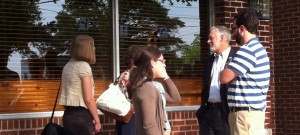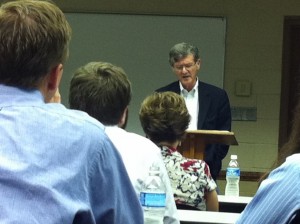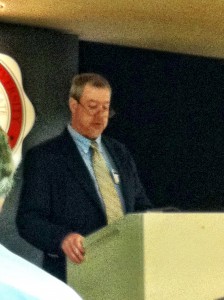 Hanging Out with Baptist Scholars
Hanging Out with Baptist Scholars
The first half of my week was spent hanging out with Baptist scholars. (Yes, sometimes even professors and graduate students hang out.) We were gathered at the National Association of Baptist Professors of Religion (NABPR). The group is made up of Baptist graduate students and professors who teach in undergraduate, professional and graduate programs of religion.
For many years the group met during the joint gathering of the American Academy of Religion and the Society of Biblical Literature. When these two largest of academic religious organizations in North America stopped meeting together in 2007, the NABPR decided to meet independently.
Beginning in 2008 the NABPR met in this new way at Belmont University in Nashville, Tennessee. I joined them – just days after defending my dissertation. Since then they have convened in May at Baylor’s Truett Theological Seminary (2009), Mercer’s McAfee School of Theology (2010), and this week at Gardner-Webb University and Divinity School.
The decision to meet independently seems to be proving a good one. By meeting at a Baptist campus and allowing two-and-a-half days rather than two-and-a-half hours, quite a few additional things can happen: paper presentations, conversation, workshops, networking, and shared meals. (I mean. What is a Baptist meeting without food, really?)
This kind of hanging out is better for the kind of support and collegiality that is needed for scholars and their work to thrive. Like pastors, college and seminary teachers need peer and senior mentorship, too. Of course we all have other disciplinary groups that fill up our dance cards each year. Such academic guilds (groups that gather people around their special area of study – biblical interpretation or ethics or pastoral theology) give us a sense of academic belonging.
The gathering of Baptists is helpful for related but different reasons. For one, it is important to engage with scholars beyond our own narrow disciplines but in such a way as to be able to interact (harder to do in gigantic meetings like AAR and SBL). So for example, I heard papers about locusts, clergy sexual misconduct, widows in the Hebrew Bible, early twentieth century Baptist women, evangelicals and Muslims, vocation in Baptist universities and the relationship between landmarkism and fundamentalism. Another good purpose for this gathering is to inhabit some space in which we can think with others about the connections between Baptist faith and identity and the array of disciplinary teaching and scholarship that we each engage in our work.
I presented a paper from my ethnographic research about “Anna” entitled, “(Sub)Ordination: How Clergywomen Embody Schism in the Southern Baptist Convention.” It was condensed from one chapter of my forthcoming book. No matter how many times I present this material, I never quite remember how it can hook people emotionally. It evokes stories. It invites sharing of experiences. It causes people to make connections to their past and to their own churches, friends and family. Lecturing from a manuscript is not my preferred form of teaching. However, I made every effort to abide by the 20-25 minute rule and read my paper. Then I moved out from behind the lectern and closer to where people are sitting to engage them and help them engage each other. They did all of that. It was lively. And the conversation when on beyond the allotted time. Groovy.
 Here are a few other moments that stand out for me. . . .
Here are a few other moments that stand out for me. . . .
I crashed the graduate student gathering at which Bill Leonard and Stephen Chapman spoke about the vocation of the Baptist scholar. My own research and teaching concerns with formation drew me to that gathering. And I love getting to know the graduate students and hearing what they are working on, thinking about and struggling over. My favorite quote (paraphrase) from Chapman: “the crazy question that comes from the church member is a gift. It will teach you how to say helpful things in compelling ways.” From Leonard: “I don’t trust institutions.” That’s one I resonate with for sure. He followed it up with the bare bones expectations from any institution: “I expect to be able to use my voice . . . to have a reasonably safe environment to live and speak out of conscience.” So Baptist. On each count.
 Another moment in the meeting that stands out for me was the presidential address that my friend, and NABPR President, Dalen Jackson gave: “Texts Domesticated, Dissected, Desiccated: Hermeneutical Challenges for Baptist Scholars.” He argued that scholars need to pay more careful and sustained attention to two groups of Bible interpreters all around us: Christians in America and gathered congregations. His paper challenged all scholars of religion, but biblical scholars in particular, to connect highly specialized studies to the wider, everyday lives and “folk hermeneutics” of believers and seekers. One of the best quotes came from one of his college teachers, Karen Joines: “It is such a small thing to be right.” It is a much greater thing (in every way) to engage people with biblical interpretations that are part of larger practices of reading and meaning making. Such practices are more than esoteric offerings of “new knowledge” and should instead be part of a habit of reading together that is communal, sacramental, spiritually formative, imaginative and integrated.
Another moment in the meeting that stands out for me was the presidential address that my friend, and NABPR President, Dalen Jackson gave: “Texts Domesticated, Dissected, Desiccated: Hermeneutical Challenges for Baptist Scholars.” He argued that scholars need to pay more careful and sustained attention to two groups of Bible interpreters all around us: Christians in America and gathered congregations. His paper challenged all scholars of religion, but biblical scholars in particular, to connect highly specialized studies to the wider, everyday lives and “folk hermeneutics” of believers and seekers. One of the best quotes came from one of his college teachers, Karen Joines: “It is such a small thing to be right.” It is a much greater thing (in every way) to engage people with biblical interpretations that are part of larger practices of reading and meaning making. Such practices are more than esoteric offerings of “new knowledge” and should instead be part of a habit of reading together that is communal, sacramental, spiritually formative, imaginative and integrated.
For me there were other good moments, lively conversation, some dulcimer music, reconnecting with friends, beer and pizza, and time to go deeper into thinking together about the work that fires our souls. Let’s do it again next year. In Nashville.



